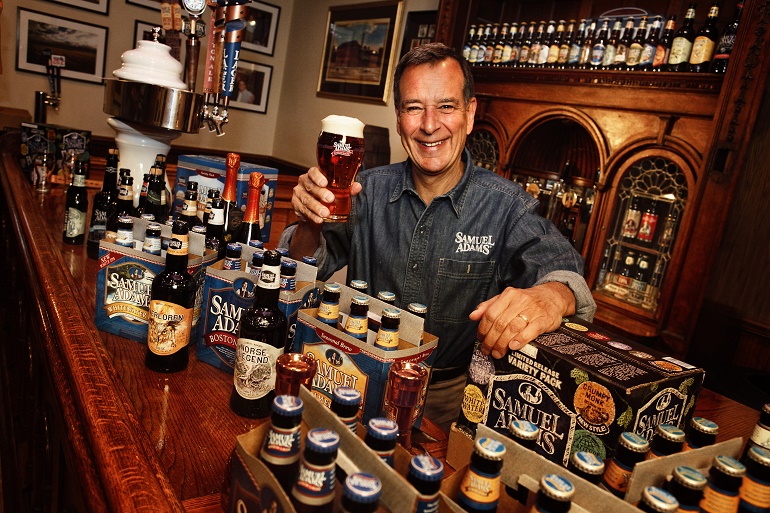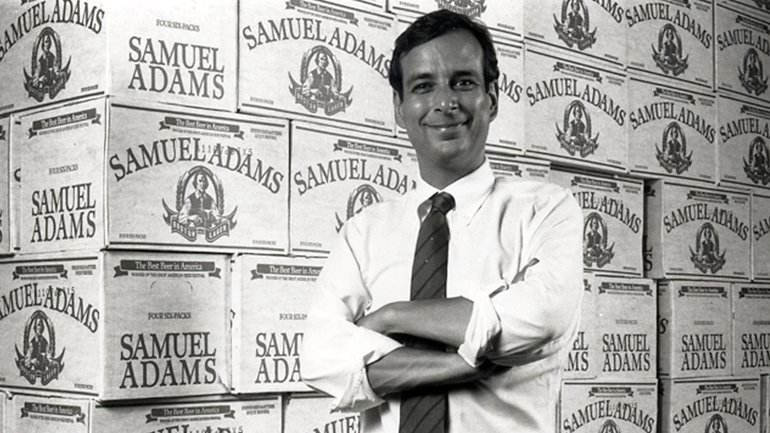Start 14-Day Trial Subscription
*No credit card required

Innovators Series: Jim Koch
Of all the American brewers out there, Jim Koch is perhaps the most recognizable. TV viewers have come to expect him on the screen as soon as they hear the first guitar licks of George Thorogood and the Destroyers' classic, “Who Do You Love?”
Those commercials – showing Koch strolling hop farms in Germany, employees smiling and drinking a beer on a Friday afternoon, or brewers talking about the creation of a new brew – have helped consumers connect with Samuel Adams, the flagship line of beers produced by the Boston Beer Company. And it has been accomplished without the very gimmicks that Koch rails against when talking about the big brewers. No slapstick humor, no barely bikini-clad girls or talking animals. Just beer and the people who make it.
Koch (pronounced “cook”), the famed founder of the Boston Beer Co., is credited with shepherding the brewery from a small operation that started in his kitchen and saw him walking from bar to bar with bottles in his briefcase to the largest American craft brewery, now making nearly 2 million barrels of beer annually. Spend some time in craft brewing circles these days and you’re likely to hear a lot of chatter about that number. Brewers, beer drinkers and even folks in Washington, D.C., want to know if when Boston Beer reaches that production milestone, will it still be considered craft?
For now, the answer to that question is no. That’s because the Brewers Association, the Colorado-based trade group that represents small American brewers, defines a craft brewery in part as one that produces no more than 2 million barrels a year. No brewery has eclipsed the mark since it was set back in 2006, and Koch knows that fact well, since he served on the association’s board of directors when the definition was created. Twenty-six years after starting what has become a true heavyweight of American brewing, Koch is poised to outgrow the label he helped define.
When the Boston Beer Co. crosses that 2 million barrels by sales volume threshold – something that could happen this year or next – under the current definition the Sam Adams line of beers would no longer be considered craft. That would be a huge blow to the industry as a whole.
In 2009, craft beer sales grew by 7.2 percent by volume and now account for 4.3 percent of the total beer market, according to the Brewers Association. Craft beer’s growth came as overall beer sales in the United States fell by about 5 million barrels. Samuel Adams accounts for significant chunk of that craft industry growth, and if they were to be lumped in with the big guys, it could mean an overall loss for craft beer sales.
However, all hope for redemption is not lost. The Brewers Association has long viewed the definition as a shifting line in the sand, according to board members and brewers familiar with the process. If a brewery was to get close to the 2 million mark the definition could be revisited, and there have already been discussions on the topic. It is likely that it will be bumped up to as high as 6 million barrels, according to those in the know. Even that eye-popping number would still be a relatively small output in the brewing world, especially when you consider that the large breweries produce tens of millions of barrels each year, attempting to pass off brands such as Blue Moon, a MillerCoors product, as craft.
Koch recalled in a recent interview with The Beer Connoisseur that the craft brewer definition was created at a time when his brewery was around 1.2 million barrels. Even at that point, 2 million seemed a long way off. And the thought was, according to Koch, if anyone ever got close to the line the board would reexamine the definition.
“The original intention was just to say that we’re different from Bud, Miller and Coors and Pabst,” he said. “They are who they are and we are who we are. I think that’s the way the consumer sees it.”
When you consider that the 1,600 or so craft brewers in the country these days only account for about 9 million barrels per year, it’s obvious that the craft segment still has a long way to go. But it has made tremendous progress in the last 30 years.
 A CRAFT BEER CELEBRITY
A CRAFT BEER CELEBRITY
Koch, 61, says he still enjoys coming to work each and every day and shows the same passion and spirit with new brewery projects as he did two and a half decades ago when he started peddling Boston Lager throughout Beantown. On days when he is at the company’s small research and development brewery in Boston (most of the brewing is actually done in Ohio and Pennsylvania) and tourists catch a glimpse of him, you’d think Mick Jagger had just shown up. People line up to shake his hand, pose for pictures, pepper him with brewing questions and ask for autographs.
Up close and away from the crowds, however, he comes across as a regular, aw-shucks kind of guy with a mid-tempo, gravelly voice and a pleasant smile. He’s a natural salesman and has gotten his facts down to simple points that clearly illustrate both the importance and relative size of his brewery. “The big guys spill more per year than we make,” is one familiar Koch line.
He’s proud to talk about his brewing heritage. (In case you hadn’t heard, he’s a sixth generation brewer.) Boston Lager is based on a recipe that was in the family line and given to him by his father. He brewed it for the first time, like so many homebrewers before and after him, in his kitchen.
While it took hard work and determination to launch back in the mid-’80s, Koch had a strategic advantage over others who opened around the same time that helped propel him to the top of the craft sooner than anyone could have expected. The man is incredibly smart. He holds B.A., M.B.A. and J.D. degrees from Harvard University and has brought his keen business sense to the brewing world, watching as Boston Beer blossomed into a company now traded on the New York Stock Exchange. And while some might gripe about his shrewd business dealings – the documentary “Beer Wars,” for instance, made him out to be a ruthless owner who would not help a former partner out – the fact remains that, at least publicly, his fellow brewers and owners hold him in high regard.
During the hops shortage a few years back, Boston Beer sold cones at cost to brewers around the country. Others are still talking about the generosity Koch and his brewery showed two years ago at the Craft Brewers Conference, where visitors were greeted with a belly-busting New England clambake and bottomless kegs.
Those are just two examples of how large and profitable the brewery has become. It got there through some smart investing, a strong marketing push and, of course, by making flavorful beer. Samuel Adams Boston Lager has led the Boston Beer Co. to become the largest craft brewery in the country and the fifth largest overall in the United States, behind behemoths like Anheuser-Busch InBev, MillerCoors and Pabst.
The success of Boston Lager in particular has helped the American craft beer scene overall. It has been a gateway beer, if you will, enticing those who previously might have gone for macrobrews that rely on Beechwood aging or triple-hops brewing to try something new. Liking what they tasted, consumers began broadening their beer horizons, trying other craft beers and digging deeper into the rest of the Sam Adams line to sample brews like the perennial favorite Summer Ale, the beer-geek inspiring Utopias and the wickedly delicious Imperial White.
The brewery was ahead of the curve in releasing its own signature glass several years ago, and it even partnered recently with a New York City-based butcher to create a “new” cut of beef to pair with Boston Lager.
The company’s Boston brewery is one of the city’s top tourist attractions. Simply put, Sam Adams is one of the most recognizable beer brands in the country.
GROWING PAINS
The 2 million number also matters to the bottom line of the brewery itself. For tax purposes, the Internal Revenue Service keeps track of the amount of cold wort in fermenters. Michelle Sullivan, Boston Beer’s spokesperson, said the amount reported to the government is not publicly disclosed and, as such, would not be released.
In 1976, Congress passed the small brewers tax differential. Those with less than 2 million barrels of wort pay $7 a barrel on their first 60,000 barrels. Larger brewers pay $9 per barrel. So, when Boston Beer passes the mark – and it is a question of when, not if – the company will owe more to Uncle Sam. In 1986 the government amended the amount for larger breweries to $18 a barrel. Last year Congressmen Richard Neal (D-MA) and Kevin Brady (R-TX) introduced House Resolution 4278, which would reduce the excise tax for breweries from the existing $7 per barrel to $3.50 for the first 60,000 barrels produced. The bill “would also provide a tax reduction from the current rate of $18 per barrel to a reduced rate of $16 for the first 2 million barrels for small brewers that produce less than 6 million barrels,” according to the Brewers Association, which is promoting the bill in Congress.
To match the House bill, Senators John Kerry (D-MA) and Mike Crapo (R-ID) introduced S. 3339 last May. Both bills have received strong bipartisan support from elected officials across the country, likely meaning good news is in store for the smaller breweries and their bottom line.
Koch, meanwhile, seems unbothered by all the 2 million chatter. “If we ever hit 2 million it would be a keg of beer,” he said. “And half of it would be craft beer? And the other half would be non-craft beer? Or a six pack that will have three bottles of craft beer and three that aren’t?”
STAYING TRUE TO ROOTS
For as successful as Boston Beer has become, Koch is determined to keep inventing, pushing boundaries and trying to remember where he came from. In the last few years the brewery has released its Barrel Room Collection, and three beers derived from a 7-percent alcohol beer Koch calls “Kosmic Mother Funk, or K.M.F.” were introduced last year. The barrel-aged beers – American Kriek, New World Tripel and Stony Brook Red – have received high praise from beer aficionados lucky enough to taste them (currently they are only available in the Boston area and in Colorado).
Perhaps the biggest thing to come out of the brewery as of late is the collaboration beer brewed with Germany’s Weihenstephan, the world’s oldest brewery. Koch has been talking about this beer for years and, as of this writing, it is expected to be available this fall. Called Infinium, it is brewed in the Reinheitsgebot tradition, or German Purity Law. Koch poured samples during a recent event at the brewery, and the unique beer revealed itself to be champagne-like, with a sweet taste and a slightly spicy finish.
“This is a true collaboration. It’s our input, it’s their input,” said Koch. “No one has ever done this. It was a lot of fun. It was crazy.”
LOOKING AHEAD
While others who played key roles in launching and promoting today’s American craft beer movement have begun to retire (Fritz Maytag of Anchor Brewing) or are talking about handing the reins over to the next generation (Ken Grossman of Sierra Nevada Brewing Co.), Koch said recently that he has no plans to step aside or slow down anytime soon.
“I love doing what I am doing,” he said. “I don’t want to work for anyone else.”
As for passing along the keys to the kingdom, Koch has several children, two of whom are now adults, one working as a high school guidance counselor and the other as a public defender. In fact, a beer first brewed for his daughter’s wedding later became the brewery’s recent spring offering, Noble Pils. But at this point, there are no plans for them to rejoin the family business. “I’ve always encouraged them to find their own path and they did,” he said. “They both worked here and they know how to brew. But they found their own careers.”
So the company will remain in his hands for the foreseeable future. Koch holds all of the Company’s Class B Common Stock, meaning that although there is a board of directors and shareholders to answer to, any decision regarding the brewery must receive his blessing first.
He tries to stay true to the homebrewing roots that got him to where he is today, a kind of show of thanks to the customers who kept the brewery afloat in the early years. The Samuel Adams Longshot Competition encourages homebrewers to submit beers that are judged by industry professionals, with the winners later brewed, bottled and released by Boston Beer in Sam Adams variety packs. (Full disclosure: This reporter participated in the final judging of this year’s contest.) Winners are announced each year in September at the Great American Beer Festival in Denver.
Amidst all the conversation about production numbers, Koch seems amused and bewildered at the same time that so much attention is being paid to the 2 million mark. “It’s both surreal and sobering,” he said. “When we first started I wanted to get to 5,000 barrels and eight employees. Obviously we blew that away.” Today the company employs nearly 800 people.
What will he do if the number is changed to, say, 6 million barrels and under to define craft, and then the brewery eventually reaches that lofty milestone? Koch lets out a hearty laugh.
“I guess the most important thing is, if the beer is still the same beer, made in the same way with the same ingredients, what does it matter?”



